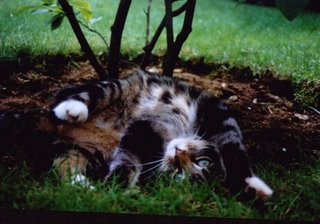Characters, we've been led to believe, are supposed to behave believably, to have a reason for their actions. Even if they act 'out of character' they are supposed to do so in a way that we can accept as a product of the stress they are under. Perhaps it is their 'dark side' coming out. Or in the case of some irredeemably evil guy behaving well for a change, it's because behaving like a jerk isn't getting him what he wants.
But at least you understand why he's doing what he's doing.
And then there is
Alias.
I don't watch a lot of television. And frankly, the only reason I started watching
Alias was because during football season two years ago, they had previews on that made me notice Michael Vartan. I thought he would be worth a look -- doing a bit of 'hero research' (see
Hugh-Jackman-in-a-towel).
And I stayed to watch because I found the characters interesting. They had moral dilemmas. And as much as
Alias was entertaining in a gadgety sort of way, and in an admiring Sydney Bristow as she yet again donned another disguise and outran and outsmarted the bad guys way, and, of course, in a Michael Vartan watching way, it was the character interplay that made me come back.
And then it just got weird. It was like the later writers didn't read what JJ Abrams had written in the earlier episodes, like they didn't know who these people were. They were just cartoons with some sort of character trait (Marshall is the techno-geek, etc) and if they ran into a blind alley, well, you could just pull out a trick (reminding me of Mark Twain's lampooning James Fennimore Cooper's 'gentle art of the forest') and, poof, your problem would be solved.
No. It doesn't work.
At the end of last season (sorry, spoiler ahead, but since it's been around for a year, if you haven't seen it by now, you deserve to have it spoiled), when they had Vaughn tell Sydney he wasn't who she thought he was, right when they were on the verge of getting things straightened out between them, it didn't work.
It didn't work because on
Alias almost no one is who you think he is. Except Vaughn. Vaughn was the one sane straight shooter in the whole bunch. The one Sydney -- and we -- could count on. He was the guy we trusted not to be ambiguous, not to live a lie, not to have a hidden agenda.
And giving him one undercut his credibility at the same time it weakened everyone else's too, because after you've seen people shape-shift a dozen times, it ceases to be interesting and just becomes annoying. It also makes the characters all more alike, not distinct.
Then, of course, they ostensibly killed him in a car crash before he could say any more. Except they didn't really kill him (another plot device sadly overworked in
Alias) so they could kill him again (can you say
overkill, anyone?) in the first episode this season.
How many times are we going to watch Vaughn die?
The last one seemed pretty definitive, annoying though it was. But apparently even a barrage of bullets wasn't enough, and now -- after weeks on hold -- he turns up in Bhutan, reports of his death obviously exaggerated.
Don't get me wrong. I'm delighted Vaughn's not dead. For the last year he was the only reason I stuck around watching. But I'm annoyed that the writers are playing fast and loose with his character because they are also betraying the audience's trust.
I'm not saying characters can't change. They
should change. But they shouldn't flip-flop just to provide a twist or a cliff-hanger ending. They should have an integrity that allows them to act like real people would act. Even in a universe as convoluted as
Alias's, they need to have an inner logic.
It isn't easy. But I think it's essential. If we can't believe in characters acting with some sort of congruence, we lose interest. We don't know who to cheer for. We feel betrayed, let down. And just because it's easier to use a trick we've used before, we as writers shouldn't always take the easy way out.
We should try to understand our characters beyond the gimmicks. We need to be faithful to who they are. Then, when they do something unexpected, our readers might be surprised, but they will believe it.
They'll say, "Wow, yes, it caught me by surprise, but you know, it makes sense."
You've got four weeks left to redeem things,
Alias. Don't let me down.


















